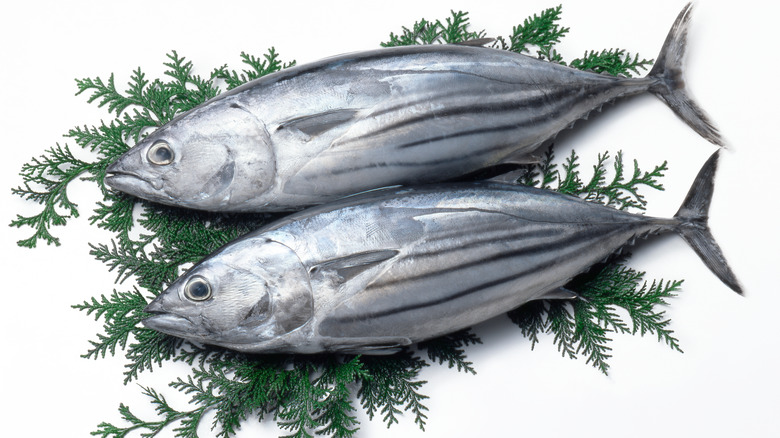Why You Should Be Eating More Skipjack Tuna
You probably know by now that you should eat more fish, given that its one of the healthiest foods around — not only is it a great source of protein, but fish is packed full of nutrients like vitamin D, iodine, and omega-3 fatty acids (that our bodies don't produce on their own), which may have both heart and brain health benefits, improve depression and other mental conditions, and help reduce the risk of type 1 diabetes and certain autoimmune diseases, according to Healthline. The US Food and Drug Administration recommends consuming at least 8 ounces, or two servings, of fish per week.
When it comes to fish, tuna is the most consumed fish in the world, reports Atuna. Canned or pouched tuna, in particular, is especially popular, with Americans eating a whopping 1 billion pounds of it a year, reports the National Fisheries Institute. It's not surprising, considering how versatile canned tuna is. Not only that, but the cans are good for years, which makes it a can that you should always have in your pantry. Tuna does have one major downside, though — it's often high in mercury, a neurotoxin that can lead to neurological problems, notes LiveStrong.
Skipjack has lower mercury and higher selenium levels than other types of tuna
Not all tuna are created equal, and some have lower mercury levels than others. One example is skipjack tuna, the smallest and most abundant commercial tuna species, according to the World Wildlife Fund. Due to its smaller size, skipjack has relatively lower levels of mercury, around one third of the amount found in albacore tuna (via Environmental Defense Fund).
Skipjack is also a great source of selenium, which the human body uses to clean out and restore cells: a single serving of skipjack provides 140% of the FDA recommended amount of selenium, reports Florida Sportsman. Recent studies seem to indicate that high levels of selenium can actually help counter the negative effects of high mercury levels, and fish with a positive Selenium Health Benefit Value, which includes skipjack tuna, can help counter the risks of mercury toxicity.
Given its lower mercury and higher selenium levels, it's safe to consume up to three servings of skipjack a week, per LiveStrong. So load up on cans of "light tuna," which tends to be mostly skipjack (sometimes mixed with yellowfin), on your next shopping trip. As a bonus, the soft and flaky texture of skipjack also makes it an ideal tuna for making tuna salad.

